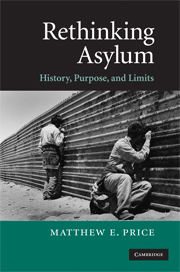Book contents
- Frontmatter
- Contents
- Acknowledgments
- Introduction
- Chapter 1 Recovering Asylum's Political Roots
- Chapter 2 Promoting Political Values through Asylum
- Chapter 3 What is “Persecution”?
- Chapter 4 Persecution by Private Parties
- Chapter 5 Asylum, Temporary Protection, and the Refugee Policy Toolkit
- Chapter 6 Restrictions on Access to Asylum
- Conclusion
- Bibliography
- Index
Chapter 2 - Promoting Political Values through Asylum
Published online by Cambridge University Press: 26 January 2010
- Frontmatter
- Contents
- Acknowledgments
- Introduction
- Chapter 1 Recovering Asylum's Political Roots
- Chapter 2 Promoting Political Values through Asylum
- Chapter 3 What is “Persecution”?
- Chapter 4 Persecution by Private Parties
- Chapter 5 Asylum, Temporary Protection, and the Refugee Policy Toolkit
- Chapter 6 Restrictions on Access to Asylum
- Conclusion
- Bibliography
- Index
Summary
Asylum's political roots highlight its expressive character: asylum is intertwined with the evaluation and condemnation of other states' internal practices. That expressive dimension sets asylum apart from other policy tools that policymakers in the West can use to aid refugees, which are “palliative,” that is, focused solely on addressing refugees' urgent needs. Other refugee policy tools include relief aid provided directly to refugees or through intermediaries such as the state of origin, intergovernmental organizations like the United Nations High Commissioner for Refugees (UNHCR), or non-governmental organizations; and development aid of various kinds designed to ameliorate the root causes of refugee flows.
States also offer various forms of protection abroad other than asylum. Some states have overseas refugee resettlement programs, under which a limited number of refugees are selected abroad, often by the UNHCR, and resettled in host states. Many states also offer protection – usually on a temporary basis – to certain non-persecuted refugees who do not qualify for asylum. In the United States, for example, the Attorney General is authorized to grant temporary protected status (TPS) to aliens from a country or region experiencing “ongoing armed conflict” when “requiring the return of aliens” to that area “would pose a serious threat to their personal safety”; to aliens for whom an “earthquake, flood, drought, epidemic, or other environmental disaster” has resulted in a “substantial, but temporary, disruption of living conditions”; and to aliens who are unable to “return[] to [their] state in safety” due to other “extraordinary and temporary conditions.”
- Type
- Chapter
- Information
- Rethinking AsylumHistory, Purpose, and Limits, pp. 69 - 102Publisher: Cambridge University PressPrint publication year: 2009



